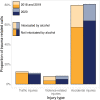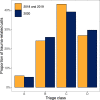Effects of the COVID-19 pandemic on trauma-related emergency medical service calls: a retrospective cohort study
- PMID: 34503453
- PMCID: PMC8426589
- DOI: 10.1186/s12873-021-00495-3
Effects of the COVID-19 pandemic on trauma-related emergency medical service calls: a retrospective cohort study
Erratum in
-
Correction to: Effects of the COVID-19 pandemic on trauma-related emergency medical service calls: a retrospective cohort study.BMC Emerg Med. 2021 Nov 19;21(1):140. doi: 10.1186/s12873-021-00511-6. BMC Emerg Med. 2021. PMID: 34794385 Free PMC article. No abstract available.
Abstract
Background: The COVID-19 pandemic has had profound effects on the utilization of health care services, including Emergency Medical Services (EMS). Social distancing measures taken to prevent the spread of the disease have greatly affected the functioning of societies and reduced or halted many activities with a risk of injury. The aim of this study was to report the effects of lockdown measures on trauma-related EMS calls in the Finnish capital area.
Methods: We conducted a retrospective cohort study of all EMS calls in the Helsinki University Hospital (HUH) catchment area between 1 January and 31 July 2020. Calls were identified from the HUH EMS database. Calls were grouped into pre-lockdown, lockdown, and post-lockdown periods according to the restrictions set by the Finnish government and compared to the mean number of calls for the corresponding periods in 2018 and 2019. Statistical comparisons were performed using Mann-Whitney U-test for weekly numbers and percentages.
Results: During the study period there was a total of 70,705 EMS calls, of which 14,998 (21.2%) were related to trauma; 67,973 patients (median age 61.6 years; IQR 35.3-78.6) were met by EMS. There was no significant change in the weekly number of total or trauma-related EMS calls during the pre-lockdown period. During the lockdown period, the number of weekly total EMS calls was reduced by 12.2% (p = 0.001) and the number of trauma-related calls was reduced by 23.3% (p = 0.004). The weekly number of injured patients met by EMS while intoxicated with alcohol was reduced by 41.8% (p = 0.002). During the post-lockdown period, the number of total and trauma-related calls and the number of injured patients intoxicated by alcohol returned to previous years' levels.
Conclusions: The COVID-19 pandemic and social distancing measures reduced the number of trauma-related EMS calls. Lockdown measures had an especially significant effect on the number of injured patients intoxicated by alcohol met by the EMS.
Trial registration: Not applicable.
Keywords: Alcohol; COVID-19; Emergency medical service; Prehospital trauma.
© 2021. The Author(s).
Conflict of interest statement
The authors declare that they have no competing interests.
Figures




Similar articles
-
Responses of a Pre-hospital Emergency Medical Service During Military Conflict Versus COVID-19: A Retrospective Comparative Cohort Study.Mil Med. 2022 Oct 29;187(11-12):e1462-e1468. doi: 10.1093/milmed/usab437. Mil Med. 2022. PMID: 34697626 Free PMC article.
-
Changes in trauma-related emergency medical services during the COVID-19 lockdown in the Western Cape, South Africa.BMC Emerg Med. 2023 Jun 27;23(1):72. doi: 10.1186/s12873-023-00840-8. BMC Emerg Med. 2023. PMID: 37370047 Free PMC article.
-
Severely injured patients do not disappear in a pandemic: Incidence and characteristics of severe injuries during COVID-19 lockdown in Finland.Acta Orthop. 2021 Jun;92(3):249-253. doi: 10.1080/17453674.2021.1881241. Epub 2021 Feb 4. Acta Orthop. 2021. PMID: 33538233 Free PMC article.
-
Impact of the COVID-19 pandemic on prehospital emergency medical service: a scoping review.Front Public Health. 2025 Mar 19;13:1543150. doi: 10.3389/fpubh.2025.1543150. eCollection 2025. Front Public Health. 2025. PMID: 40177094 Free PMC article.
-
Prohibiting alcohol sales during the coronavirus disease 2019 pandemic has positive effects on health services in South Africa.Afr J Prim Health Care Fam Med. 2020 Jul 15;12(1):e1-e4. doi: 10.4102/phcfm.v12i1.2528. Afr J Prim Health Care Fam Med. 2020. PMID: 32787395 Free PMC article. Review.
Cited by
-
Not only COVID-19 disease impacts ambulance emergency demands but also lockdowns and quarantines.BMC Emerg Med. 2023 Jan 13;23(1):4. doi: 10.1186/s12873-023-00772-3. BMC Emerg Med. 2023. PMID: 36635638 Free PMC article.
-
Pre-Hospital Emergency Medical Services Utilization Amid COVID-19 in 2020: Descriptive Study Based on Routinely Collected Dispatch Data in Bavaria, Germany.Healthcare (Basel). 2023 Jul 8;11(14):1983. doi: 10.3390/healthcare11141983. Healthcare (Basel). 2023. PMID: 37510425 Free PMC article.
-
Changes of public behavior alter weather-dependent strain on emergency medical services.World J Emerg Med. 2025 Jul 1;16(4):378-382. doi: 10.5847/wjem.j.1920-8642.2025.056. World J Emerg Med. 2025. PMID: 40708732 Free PMC article. No abstract available.
-
Paramedics' experiences and observations: work-related emotions and well-being resources during the initial months of the COVID-19 pandemic-a qualitative study.BMC Emerg Med. 2024 Aug 26;24(1):152. doi: 10.1186/s12873-024-01072-0. BMC Emerg Med. 2024. PMID: 39183333 Free PMC article.
-
Analyzing emergency call volume, call durations, and unanswered calls during the first two waves of the COVID-19 pandemic compared to 2019: An observational study of routine data from seven bavarian dispatch centres.Heliyon. 2024 Jan 23;10(3):e24839. doi: 10.1016/j.heliyon.2024.e24839. eCollection 2024 Feb 15. Heliyon. 2024. PMID: 38333836 Free PMC article.
References
-
- Druel T, Andeol Q, Rongieras F, Bertani A, Bordes M, Alvernhe A. Evaluation of containment measures’ effect on orthopaedic trauma surgery during the COVID-19 pandemic: a retrospective comparison between 2019 and 2020. Int Orthop. 2020;44(11):2229–2234. doi: 10.1007/s00264-020-04712-9. - DOI - PMC - PubMed
Publication types
MeSH terms
LinkOut - more resources
Full Text Sources
Medical
Miscellaneous

